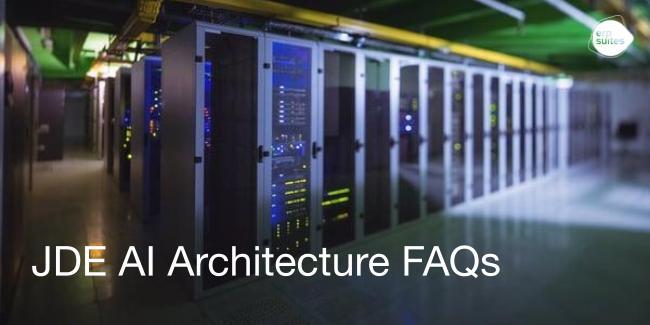Choosing an IBM i Managed Services Provider: Factors to Consider
November 27th, 2024
4 min read
.png?width=960&height=540&name=Blog%20Images%20(79).png)
Organizations have been relying on their IBM i systems to power critical business applications for over 40 years now. But not everyone has the required expertise on staff. That’s why the need for comprehensive managed services is more important than ever.
Managed services help ensure the stability, security, and optimal performance of your IBM i environment, allowing you to focus on your core business objectives. The dedicated ERP Suites IBM i team has decades of experience and helps several IBM i clients keep their systems in peak condition.
Selecting the right partner can be a daunting task. To help you make an informed decision, here are the top 4 factors to consider when evaluating IBM i managed services providers:
1) Technical expertise
2) Functional application support
3) Disaster recovery and business continuity
4) Scalability and flexibility
After you read this article, you’ll know what you should look for in an ideal IBM i managed services provider - and what to ask them to be sure.
Technical Expertise from an Experienced Team
The foundation of any effective IBM i managed services requires a deep understanding of the platform. Many IBM I experts have been in the field since its early days, and were hands-on even during the AS/400 days. However, that also means that IBM I experts are retiring and becoming harder to find.
Look for managed services providers (MSPs) with extensive experience in managing and optimizing IBM i systems. They should have a proven track record with a wide range of technical managed services, including:
- System monitoring
- Performance tuning
- Security management
- Disaster recovery planning
Additionally, a managed services provider needs experience with varying Power Processor levels. Newer generations, such as Power 10, offer improved performance, efficiency, and supportability compared to older models, like the original Power 5. The Power levels we see most commonly at ERP Suites with our IBM i managed services clients are Power 8, Power 9, and Power 10.
Managed services providers that can help you migrate to more modern IBM i hardware will also help deliver cost savings and guide you towards the optimal hardware configuration. The MSP’s overall goal is to ensure the stability, security, and optimal performance of the IBM i environment.
Questions to ask a potential MSP:
- What IBM i managed services do you offer?
- How many years of experience does your team have?
- Do you have comparable IBM i managed services clients you can reference?
- Do you have experience with a variety of Power Processor levels?
Functional Application Support for Day-to-Day Success
You’ll also need support for business-critical applications, like JD Edwards. Look for providers with a strong understanding of your ERP and CRM system requirements.
Are you running highly customized applications? These were often written decades ago in RPG, COBOL, or CL. Understanding and maintaining this code requires an MSP with expertise in legacy programming languages.
You may expect your legacy applications to have various modern bells and whistles – like user interfaces, APIs, or cloud integration. A qualified MSP can make that happen while preserving an application’s core functionality. The MSP should also be able to troubleshoot usability issues and propose solutions.
IBM i systems often coexist with cloud-based platforms in hybrid environments. Prioritize an MSP that offers timely support, thorough root cause analysis, and the expertise to implement appropriate solutions effectively.
Questions to ask a potential MSP:
- Tell me about your team’s programming language fluency.
- Can you help modernize our applications?
- What daily support can I expect?
Disaster Recovery, Business Continuity and Security in Worst Case Scenarios
Everyone wants the least amount of downtime possible. You’ll need to be aligned with your managed services provider on your Recovery Point Objective (RPO) and Recovery Time Objective (RTO) requirements.
What are their redundancy and failover mechanisms? Do they have expertise and experience in executing successful disaster recovery scenarios?
Another important consideration is data backup and storage. Traditional, physical tape-based backup systems are more complex and time-consuming to manage. This inherently brings great risk for data loss or damage. Folks running IBM i are increasingly turning to virtual tape instead. The long-term cost savings are significant.
You want a partner with experience transitioning to virtual tape solutions to help you move your own. This move can improve your recovery capabilities and reduce the risk of data loss.
IBM i’s unique database + operating system makes daily operations easier, but it is not immune to security vulnerabilities. All it takes for ransomware to infiltrate your system is compromising your IBM i’s Single Sign-On (SSO). While making access more efficient for your team with one login, the SSO can inadvertently provide bad actors with expedited entry to wreak havoc.
Does your MSP know how to work with airgaps and immutable copies for a multitiered security approach? They should.
Questions to ask a potential MSP:
- What are your protocols for avoiding unnecessary downtime?
- Tell me about a disaster recovery experience you’ve successfully managed.
- What does your security approach entail? Do you use airgaps, etc.?
Scalability and Flexibility for Your Company’s Future
As your business grows and your IT requirements change, your MSP should be able to scale their offerings accordingly:
- Expanding your IBM i infrastructure
Add new processors, move to a newer Power system, modernize green screens with graphical user interfaces (GUIs); enhancements to your IBM i’s infrastructure can lead to better interoperability with other systems. The best MSP can help advise and support this transition. - Migrating to the cloud
Are your operations currently housed within your own data center? Customers tend to leave on-premises solutions because it becomes too costly, or the service they’re receiving isn’t great. In that case, an expert MSP can help address your pain points, find a cost-effective solution, and at the end of the day, have you operating in the cloud, expanding your access to resources. - Adopting new business applications
Are you a JD Edwards customer? Are you on the latest release? Do they have CNCs to manage your JDE? What about a comprehensive CRM? If you have an ERP, CRM and IBM i, are you getting the best visibility into their data for the best decisions? An MSP fluent in both JD Edwards and IBM i can help answer these questions and provide support to bring any new additions to fruition.
Evaluate the provider's pricing models and service delivery options to ensure that they can offer cost-effective and flexible solutions that align with your long-term strategic plans.
Questions to ask a potential MSP:
- What is your cloud migration protocol?
- Do you have CNCs with JDE expertise?
- Can you help me get the most out of my data from all my systems?
The Right IBM i MSP Will Help Your Business Remain Competitive
At the end of the day, the bread and butter of a qualified MSP is demonstrated expertise and excellent customer service.
Keep these questions in mind as you select a provider:
- What IBM i managed services do you offer?
- How many years of experience does your team have?
- Do you have comparable IBM i managed services clients you can reference?
- Do you have experience with a variety of Power Processor levels?
- Tell me about your team’s programming language fluency.
- Can you help modernize our applications?
- What daily support can I expect?
- What are your protocols for avoiding unnecessary downtime?
- Tell me about a disaster recovery experience you’ve successfully managed.
- What does your security approach entail? Do you use airgaps, etc.?
- What is your cloud migration protocol?
- Do you have CNCs with JDE expertise?
- Can you help me get the most out of my data from all my systems?
Your IBM i system helps you offer robust services to your customers; you want your IBM i MSP to do the same for you. If you found this article and the information provided helpful, then consider ERP Suites as your IBM i managed services provider.
Here’s how ERP Suites can keep your IBM i environment working for you.
Leyla Shokoohe is an award-winning journalist with over a decade of experience, specializing in workplace and journalistic storytelling and marketing. As content manager at ERP Suites, she writes articles that help customers understand every step of their individual ERP journey.
Topics:



.png?width=650&height=325&name=Blog%20Images%202_1%20(4).png)
.png?width=650&height=325&name=Blog%20Images%202_1%20(5).png)
.png?width=650&height=325&name=Blog%20Images%202_1%20(3).png)
.png?width=650&height=325&name=Blog%20Images%202_1%20(2).png)
.png?width=650&height=325&name=Blog%20Images%202_1%20(1).png)
.png?width=960&height=540&name=Blog%20Images%20(96).png)

.png?width=960&height=540&name=Blog%20Images%20(90).png)
.png?width=960&height=540&name=Blog%20Images%20(88).png)
.png?width=960&height=540&name=Blog%20Images%20(87).png)
.png?width=960&height=540&name=Blog%20Images%20(86).png)
.png?width=960&height=540&name=Blog%20Images%20(85).png)
.png?width=960&height=540&name=Blog%20Images%20(83).png)
.png?width=960&height=540&name=Blog%20Images%20(82).png)